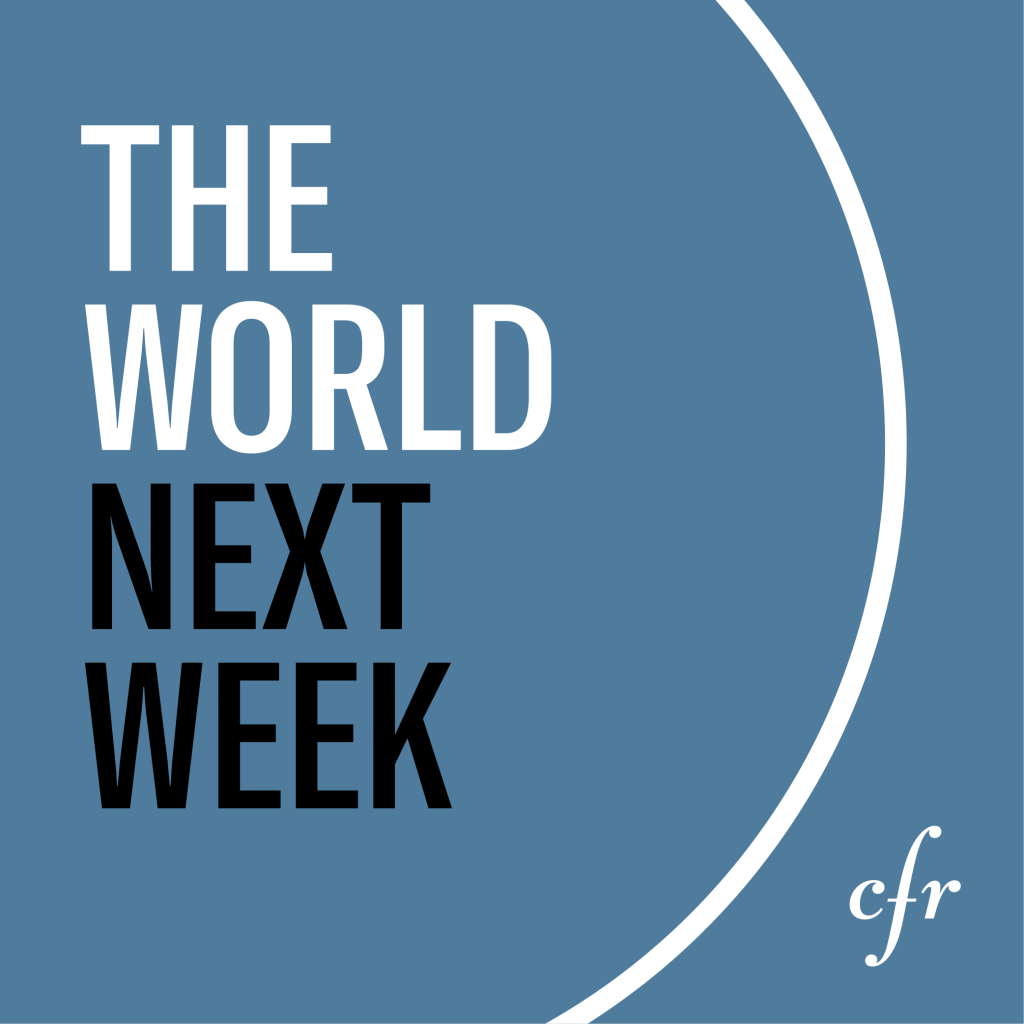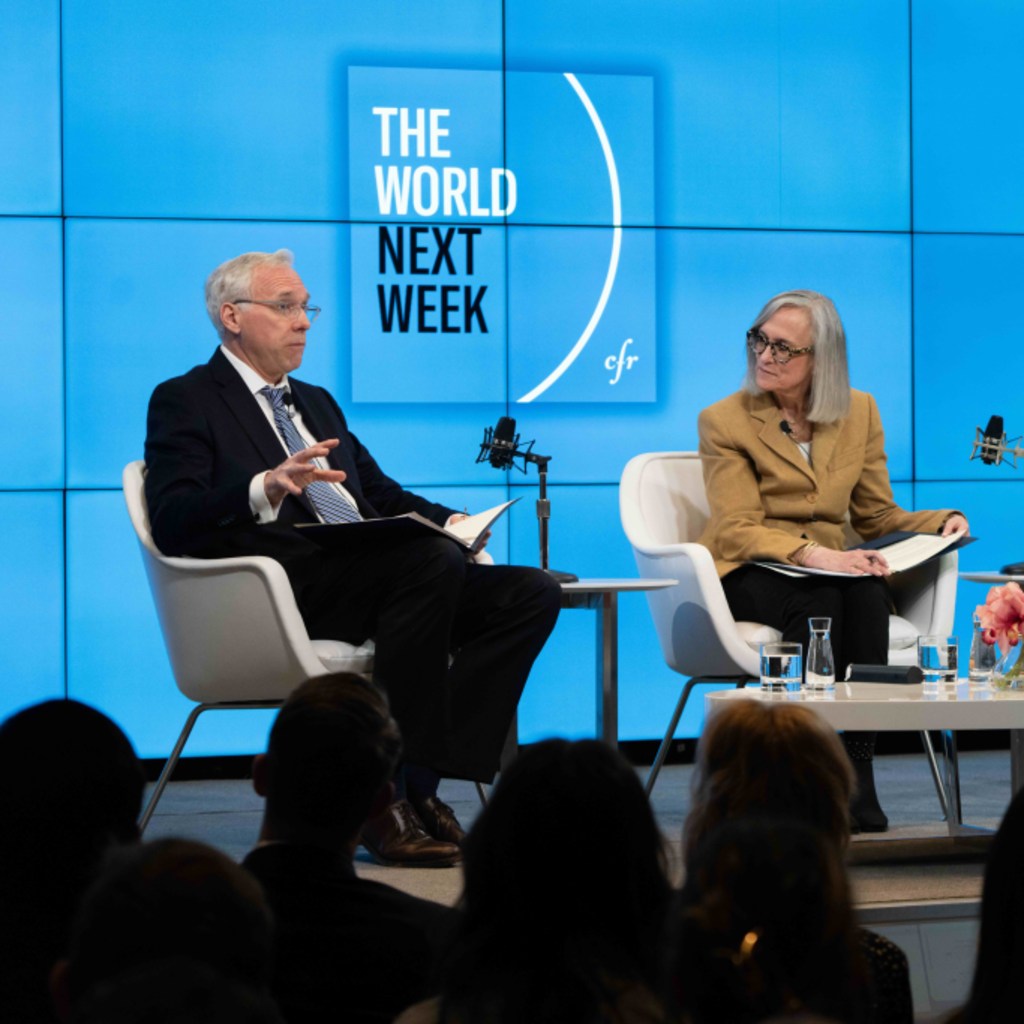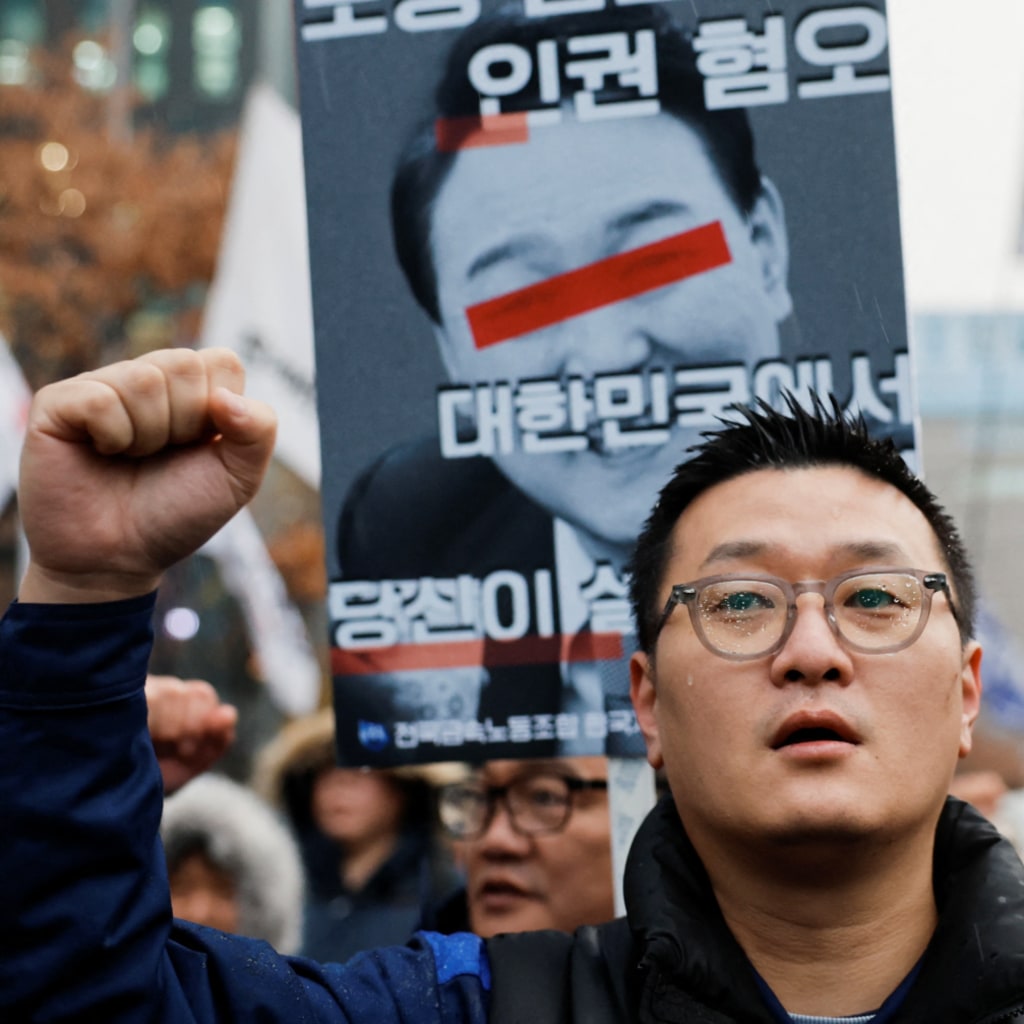Blinken’s Rescheduled China Trip, Modi’s State Visit to U.S., Ukraine’s Counteroffensive, and More
U.S. Secretary of State Antony Blinken finally heads to China amid hopes that U.S.-China tensions will subside; U.S. President Joe Biden hosts Indian Prime Minister Narendra Modi for a state visit to focus on expanded, strategic economic ties; Ukraine presses on with its long-awaited counteroffensive; and four indigenous children survive forty days in the Amazon after a plane crash.
Published
Hosts
- Robert McMahonManaging Editor
- Carla Anne RobbinsSenior Fellow
Associate Podcast Producer
- Ester FangAssociate Podcast Producer
Editorial Director and Producer
- Gabrielle SierraDirector, Podcasting
Transcript
MCMAHON:
In the coming week, U.S. Secretary Blinken visits Beijing, President Biden hosts India’s Prime Minister Modi for a state visit, and Ukraine forges ahead with its long-awaited counteroffensive. It’s June 15th, 2023, and time for The World Next Week. I’m Bob McMahon.
ROBBINS:
And I’m Carla Anne Robbins.
MCMAHON:
Carla, let’s kick off with some diplomacy, shall we? This weekend, U.S. Secretary of State Antony Blinken will land in China. Now, this was supposed to happen earlier in the year, and we then talked about, for several weeks, the so-called spy balloon incident and all sorts of other episodes of rancor interceded, but things are back on. Are the two sides then going to be making nice and making productive conversation?
ROBBINS:
If only. So Bob, it’s a sign of how fraught this relationship has become that President Biden and China’s President Xi Jinping agreed way back in November that Tony Blinken would go to Beijing early this year, and it’s taken seven months to make that happen, and at this point, we’re pretty sure it’s going to, but if you recall, we predicted that, and then it all fell apart. As you said, Blinken’s original trip was scheduled for February than just before he was to leave a Chinese spy balloon was spotted over Montana, and Congress was up in arms and the administration canceled that visit.
The Chinese then spent the following four months pretty much ghosting the administration. Beijing refused to reschedule the Blinken visit. Xi rebuffed requests for a call with Biden, and earlier this month, as we discussed on the podcast, China’s new defense minister refused to meet with Secretary Defense Lloyd Austin, when both men spoke at the Shangri-La Dialogue in Singapore. Then, last week when news began to leak out, that Blinken’s trip was finally back on, the Wall Street Journal reported that Cuba had agreed to let China build “An electronic eavesdropping facility” on the island just 100 miles south of the U.S. The administration first called the report inaccurate, but then backed off and said that China has had an installation in Cuba to spy on the U.S. since before 2019, so what is it about 2019? Oh, yes, that was on Trump’s watch. This, in turn, provoked, once again, outrage from the Hill, and for Blinken, if it didn’t feel like déjà vu, it probably felt like Groundhog Day, the movie, that is.
Anyway, the administration finally announced yesterday, Wednesday, that Blinken is indeed going next week. So while all this ghosting was going on, there were regular reminders of why the two countries really need to lower the heat and talk to lessen the chances of at least an inadvertent conflict. Late last month, the Chinese jet fighter buzzed a U.S. spy plane. Pretty close call, according to U.S. officials. A few days later in the Taiwan Strait, once again, international waters, the Chinese warship crossed the bow of the U.S. Navy destroyer really close.
It’s been a really tense time, so are there going to be any breakthroughs? Just reestablishing regular communications will probably be the best that they’re going to going to hope for.
MCMAHON:
That’s what’s going to be my followup. You can’t say the word diplomacy without saying the word deliverable, Carla, so a deliverable will be good photo ops potentially, or at least reasonable sounding comments from these two giants that have been at such odds, as you’ve spelled out. As we talked about previously as well, I think a lot of other countries are looking for that for some sort of gesture of, if not rapprochement, at least sort of civil conversation and so forth.
ROBBINS:
In a briefing with reporters on Wednesday, the assistant secretary of state for East Asian and Pacific Affairs said, and this is a great quote, “This is not a visit, which I would anticipate a long list of deliverables.” That’s a great Washington term, so they’re certainly lowering expectations. U.S. officials say that Blinken plans to raise the topic of tensions over Taiwan, as well as Ukraine, the harassment of U.S. citizens in China. The Chinese seem interested in publicly dissing Blinken, so maybe the photo ops won’t be so friendly. At least before the trip, they were doing a lot of luxury things, but they also want a personal invitation for Xi to come to the U.S. and meet Biden during the November APEC Summit, so maybe they will go for the smiley face. Really, the most important thing here is that this is going to increase the chance that these two countries who are talking to each other, maybe lessen the chance that these shifts are going to end up ramming each other.
The other thing the Chinese want is they really want more economic contact, less diplomatic contact, so they would like to see Yellen come, the treasury secretary come. They’d like to see the trade rep come, Katherine Tai, so Blinken maybe less so. They don’t seem to be a big fan of Tony Blinken. They much more have economic ties, so maybe for them, this is an opening for that, so taking’s better than not talking.
MCMAHON:
And they’ve had Elon Musk over in a much cited visit, so there are business titans who-
ROBBINS:
A very diplomatic guy.
MCMAHON:
Yes, yes, but they did also have fairly recent conversations that were seen to be, if not, let’s say cordial and slightly productive with the Commerce Secretary Gina Raimondo, so you’re right. I think the econ is the path here for some sort of parley that could be seen as forward-looking and, “Get us away from this,” all these kind of looming clashes that seem to be on the horizon.
ROBBINS:
Well, the Chinese also have to be very closely watching what’s going on in Europe, at the same time, because they’ve spent an enormous amount of effort sending very senior officials across Europe, as we’ve discussed, trying to persuade the Europeans that they shouldn’t be decoupling from China, but if anything, decoupling from the United States, and the Europeans, interestingly enough, the French right now who seem to be sort of going pro-China, the French right now are talking potentially about getting into a new trade spat with China. Got Ursula von der Leyen, who’s coming up with a new economic security strategy that seems to be very interested in de-risking in the relationship with China, so I think the Chinese are going to have to make some sort of decisions if they were hoping to create a new world in which their relationship was going to be with Europe and that they were going to freeze the United States out. I don’t think that’s moving forward the way they had hoped.
MCMAHON:
But again, at the very least, the meeting is happening. Now, let’s hope it’s not overtaken after we tape this, Carla, but let’s say it goes forward. That’s something to be said.
ROBBINS:
Well, watch the skies, Bob.
MCMAHON:
Indeed.
ROBBINS:
Let’s talk about another high-level visit. Next Thursday, India’s Prime Minister Narendra Modi will arrive in D.C. for an official state visit, including an address to a joint session of Congress. The Biden administration’s been cultivating India’s a counterbalance to China. India’s a member of the so-called Quad Security Dialogue, but Modi’s really a problematic ally. He’s increasingly autocratic at home and he’s far too cozy with Putin, buys a lot of oil and arms from Russia, and he’s refused to condemn the invasion of Ukraine. So what’s Washington hoping to get out of the visit? They’re certainly investing a lot in this guy.
MCMAHON:
Well, if the hope for the U.S.-China talks was some econ progress, the hope for and the expectation in this visit with India is going to be a real surge or a ramping up in, not only the rhetoric, but the actual agreements regarding U.S.-India economic cooperation. It’s worth noting a few things. First of all, you’re right, Modi will be addressing Congress for the second time. That is something that only three other leaders, I believe, have done in history, Winston Churchill being one of them. I think he did it three times, and no other Indian leader has done that twice, although other Indian leaders have addressed a joint session of Congress.
Again, that’s holding up the fact that this is a very important relationship, and I think too important for there to be any sort of public scolding of Modi for his domestic record, let’s say, on democratic backsliding, and it’ll really be playing up this economic side. Last year, the trade between two countries is estimated to be 191 billion. That means United States is the largest trading partner for India. U.S. companies have invested something like 54 billion in India. Indian companies have invested 40 billion in IT and pharmaceuticals and so forth. There are now plans announced by Air India to purchase something like 200 Boeing aircraft, and those types of deals are what the Washington would like to be doing more of, maybe potentially as a way of stepping in with, as relations with China’s sour and maybe those relationships continue to dry up.
One of the big centerpiece is an acronym you’re going to hear a lot of during the week ahead and beyond. It’s called ICET, or the Initiative on Critical and Emerging Technology. This was announced back in May 2022 by Modi and Biden, and it’s going to continue to expand a strategic technology partnership. It’s going to be defense cooperation, involving governments, businesses, academic institutions.
There already is a great deal of sort of interconnection between the U.S. and India populations. There’s a very large Indian diaspora in the United States. There are people of Indian background who are now in very high positions in, especially U.S. tech companies, and it’s among the reasons why this state visit, which usually is a much ballyhooed dinner, is becoming one of the hottest tickets in town. It’s always a hot ticket. This one’s particularly hot because there are so many prominent Indian-Americans who are clamoring to go to this event. I don’t know if the prime minister’s going to be singing any Don McLean songs, but that’s a reference to the South Korean President, we should say, but regardless of that, I think it’s going to be very closely watched. These meetings, like so many other state visits, so much of the work has already been done. They don’t have these meetings, unless they know there’s some deliverables. There’s that word again. So I think you’re going to be seeing an announcement by the two leaders about further entrenching some of these economic ties.
Among other things, it’s been mentioned repeatedly, be worth watching, is the degree to which India takes a bigger role in the global supply chain in some of these critical areas of manufacturing and technology that the U.S. has relied on China, among others for, so lots to talk about, lots to listen, and I don’t think there’s going to be a great deal of rancor over India’s kind of non-aligned stance on so many issues. I think you’re going to see them be unapologetic about their ongoing relationship with Russia and their sort of absence of condemnation of the invasion of Ukraine, but by the same token, they’ll be a great deal of talk about, the closeness of this relationship, especially vis-a-vis China.
ROBBINS:
So Washington is a town that’s expert in cognitive dissonance, which is a nice way of saying hypocrisy, but the notion of India being non-aligned, but at the same time, it’s part of this Quad Security Dialogue Alliance, whatever the Quad is, never fully understood what it is, so there’s more defense cooperation that’s going on here. We got really upset when ... Now, granted, India’s not part of NATO, but we got really upset when the Turks started buying equipment from the Russians, talking about the possibility of all sorts of technology leakage and intelligence possibilities here. We want to sell defense technology to the Indians. We want the Indians to get more integrated with us in terms of defense cooperation. At the same time, the Indians buy an enormous amount of weaponry from Russia. Why is there no conversation about the security risk that’s involved in that?
MCMAHON:
Oh, I think there’s probably those conversations going on, Carla, and I think from what I’ve heard through the years, especially in the time period fifteen years ago when the nuclear deal involving India’s civilian nuclear program was reached with the U.S., you had a great deal of conversations going on as well. In that case, you had international watchdogs brought into the issue, so I think these conversations are happening. It’s just, I think there’s a conscious decision not to make a lot of public fuss about them, but it certainly is going to come up. I think India would point out that its relationship with Russia is longstanding. It still relies on Russia to purchase a good amount of its armaments, and it doesn’t mean it’s in any way a sort of defense partner of Russia. That’s what you would hear from the India side, and it does like to call itself a partner of the U.S. Not an ally, but a partner of the U.S., which is also something, by the way, we hear increasingly on the U.S.-Turkey relationship, even though it’s part of a formal alliance with the U.S.
So it’s a partnership. They do have to be really careful about sort of leakage of sensitive technology, and the two sides have had increasing ties in a tech area across the board, and I think there’s an infrastructure that’s been developed in terms of making sure that sensitive dual-use goods are not getting into the wrong hands, and there’s a desire here. There’s a real will, and you’re seeing it in all the statements in the reporting going up to this state visit, that for them to have continue to increase this relationship, and so it is problematic, certainly as you see India stressing its desire to be independent.
And you’re going to see this further, by the way, Carla, later this year, when India hosts the G20 Summit. India is really taking on that role seriously. It wants to show that it has something to say to the world at a time when the world seems to be framed more than ever, that there is a way for countries to continue a dialogue, continue relationship, stop naming and shaming each other, and it’ll point that kind of language at the U.S., as well as other countries, but it still thinks it can do business and it can do business that’ll help India, as well as the U.S.
So again, it’s another reason why this meeting may be different from the South Korea visit where that was really very much about sort of reinforcing an alliance and really stepping up this united front, certainly against North Korea and to some extent China. This is going to be a more nuanced kind of state visit because while there’s going to be this language that is code for standing up to China, there’s going to be other language, which is code for India’s going to stand on its own feet and not be in the sway of the U.S.
Carla, this leads us into a discussion about a related area, which is Ukraine. It seems like it’s been now a couple of weeks, but it was only early this week that President Zelenskyy announced Ukrainian troops have begun their counteroffensive. That was in the aftermath of the devastating explosion and collapse of this dam that is causing ongoing damage in the Zaporizhzhia region. The main goal of the counteroffensive is to reclaim territory controlled by Russia. It is a tough campaign to say the least. Russian forces are dug in in many of these areas. Ukrainian losses are said to be high, as have Russian losses as well, but what are the chances at this point, or what do we know about the likelihood of Ukrainian success in that broader campaign?
ROBBINS:
So as you said, this is just the very start of what is likely to be a months-long campaign. It’s really far too early to be making predictions about it, other than to say what you’ve already said. It’s going to be really hard. The frontline is 600 miles long. The Russians are really deeply, deeply dug in, and in a conflict like that, the defenders have the advantage.
The Ukrainians, of course, have proved how tough they are again and again, and the U.S. and NATO allies have sent billions in weapons and ammunition, and they’ve been working with Ukraine, and they’ve trained some 30,000 troops to lead a very complex campaign with tanks, artillery, fighter jets, and only a small number of those troops are reportedly already in the fight. What they’re doing right now, from what we can tell, is they’re probing for weaknesses in the Russian defenses. These early reports in these first few days give us a sense of what they’re up against. Early in the week, Ukraine reported that its troops had recaptured several villages in the Donetsk region, then the Russians began pushing back with artillery and airstrikes. Today, Thursday, a deputy Ukrainian defense minister told reporters that for now, they’re finding it, “Very difficult to advance,” but they said the progress is confident, so who knows?
Both sides are already losing a large number of fighters, and we also know that Ukraine has also lost a lot of critical equipment. The pro-Russian bloggers have posted images of destroyed Leopard 2 tanks, those tanks that were so hard-fought to get out of NATO, out of Germany, and a large number of American Bradley Fighting Vehicle have either been abandoned or destroyed, so this is going to be a grinding fight.
As for what success is, that’s an interesting question. Zelenskyy is still insisting that his goal is to drive all Russians out of every inch of occupied Ukraine, and pretty much everyone else, although they won’t say it publicly, says that’s very unlikely, and what is key for this counteroffensive is for Ukraine to cut off, or at least put a major squeeze on this so-called land bridge, this large territory that Russia sees between its border, and annexed Crimea, and not just seize it, but to hold onto it. The reason why this is so important is the belief is, if anything is going to persuade Putin that he has to think about negotiating, that would be it. Now, does anyone know inside the mind of Putin? Of course, no one does, but that’s the feeling that that would be the closest idea of success, if not, victory for this counteroffensive.
If Ukraine’s troops do well, it should also quiet many of the doubters on Capitol Hill, and there are rising numbers of them who are saying, “We spent lots of money here. It’s time to cut back on it.” If they don’t, there’s going to be a lot of argument for, “Let’s stop throwing good money after bad,” and it’s also going to fit into this debate that’s going to be unfolding with the NATO Summit next month about how tightly to embrace Ukraine, so there’s a lot riding here as well, fundamentally, the lives of many, many Ukrainians.
MCMAHON:
Yeah, I think that’s really worth all keeping in mind, Carla, and I think you’re right, that NATO summit, which is about a little bit less than a month away now, is going to be an important point for taking stock. I mean, the international media and their audiences tend to sometimes treat these battles almost like a sporting match, and they’re taking notes, and it’s have a scorecard and everything, and so by almost mid-July, maybe there’ll be a few more villages under Ukrainian control, but what does that mean and what is the timing, and what is the sort of stamina for the international community to continue to support Ukraine in this fashion to be able to stand up to Russia?
On the Russian side, I’m interested though also, Carla, do we have any sense about their ability to kind of improve their force structure? We have this kind of sideshow going on where the Wagner Group is not taking part seemingly in the fight against the counteroffensive, in some reports saying that Russians have learned valuable, painful lessons and they’re going to be tougher now, but any sense whether like what’s facing the Ukrainians from the Russian side?
ROBBINS:
It’s really hard to tell. I mean, first of all, you’ve got the whole, “Who knows what’s going on inside of Putin’s mind?” He gave this press conference with pro-war bloggers this week, which was very odd. I mean, he was saying things about Prigozhin finally, head of the Wagner Group, and wanting to bring them back under the control of the government. Why in the world he even needs to say that? Shouldn’t they be under the control of the government?
At the same time, he also acknowledged that he said during the course of the special military operations become clear, there are shortages of many things, precision-guided munitions, communications, equipment, aircraft, drones and so on. I mean, unusual to admit that. Was he trying to rally something? He said, of course, “We’re going to get better at it.” It’s very hard to figure out what’s going on with him.
MCMAHON:
Right. It’s hard to kind of parse the candor from the misinformation and other things that come from Putin sometimes.
ROBBINS:
The whole thing is just, it’s so hard to read what’s going on inside there. I mean, it’s obviously not a transparent society, and the best that, I think we can do is see exactly what the Ukrainians are doing. They’re probing for Russian weaknesses right now. They’re trying to figure out what’s the weakness in their defense. They’re trying to draw troops forward to basically see what’s going on, and they’re losing a lot of people while they try to do that.
MCMAHON:
Yeah, and so as we speak, there’s still this ongoing devastation, I refer to from the dam collapse, and various things playing out, including the ominously lowering water levels around the giant Zaporizhzhia Nuclear Power Plant, which still is under Russian control. That’s going to be worth watching. The IAEA has paid another visit there and frame the present threat versus the future threats, and there’s just so many subplots here, Carla, we can go on for a while.
ROBBINS:
It is an extraordinary conflict and an extraordinary amount of suffering, and the Ukrainians have shown a great deal of how valiant they are, which is why when you hear people on Capitol Hill saying, “Okay, enough. We’ve done enough. It’s time to move on here.” It’s very hard not to feel outrage at that sense of fecklessness on Capitol Hill.
MCMAHON:
It’s another reason why it’s important to have ongoing, steady, solid reporting from that region, and some of the major U.S. media are doing a really good job. I just hope they keep it up.
ROBBINS:
They are, and it is extraordinary, particularly because it is so hard to report from there on the ground because, also, they’re relying on Ukrainian reporters and American reporters, on European reporters, and also, Russian reporters who are in exile.
MCMAHON:
That’s right.
ROBBINS:
All these people are taking extraordinary risks and doing valiant things.
Well, Bob, I think it’s time to pivot and discuss our Audience Figure of the Week, which listeners can vote on every Tuesday and Wednesday at CFR_org’s Instagram Story, and this week, Bob, our audience selected a miraculous figure, “Four Children found After Forty Days in Amazon.” What happened?
MCMAHON:
This is one of those incredible stories that the world occasionally encounters and truly stands back in a bit of awe, and the awe is towards these four children. Even after you hear about the way they’ve been raised and trained and so forth maybe makes it sort of less surprising, it’s still an incredible story. What happened was they were traveling with their mother. The children and their mother were part of the indigenous Huitoto people, if I got that pronunciation right, in Colombia. They were in a light plane, traveling from an Amazonian village, and it was on the 1st of May.
The plane encountered engine trouble soon after taking off, crashed an incredibly dense, forbidding part of the Colombian Amazon, and there transpired an incredible series of events. The crash did not immediately kill their mother. She lived apparently for four days before instructing her children to go and seek help, and the children are aged thirteen, nine, four, and one, and while they’re all impressive for what they encountered, the hero emerging here from the reports I’ve seen is the eldest daughter, the thirteen-year-old, Lesly, who was found holding the baby in her arms when the rescuers arrived, because she led them through the finding of food, fending off, God knows what in terms of threats from indigenous animals, snakes, and what have you. It’s heavy rain period, so torrential rain, just finding shelter, finding food.
Apparently, according to family members and members of the tribe ...By the way, the family’s name is M-U-C-U-T-U-Y. Don’t know the pronunciation so I won’t attempt it, but apparently, these members, Lesly and her siblings, to some extent, have been trained in finding food sources and being able to avoid the poisonous types of foods and flora that one would encounter in a dense rainforest, to such a degree that they existed for forty days. There’s many adults who could not last half that long, and you had this extraordinary effort by Colombian officials to find them. One point, authorities dropped 10,000 leaflets with survival tips written in Spanish and Huitoto languages. The helicopters were, according to reports that I read, blaring messages from their grandmother, from speakers to assure the children they were being looked for.
By the time they were discovered, there were about 150 troops, 200 volunteers from local indigenous groups in the operation, and as one Colombian official said, “It wasn’t even like searching for a needle in a haystack, it was like searching for a tiny flea in a vast carpet because they kept moving,” but they were found. They were weak, and they are being treated. Now, they still, according to the latest reports, have not been able to eat solid foods since they were found several days ago, but they are expected to recover physically, and one hopes, and mentally, in terms of dealing with the trauma. I think there’s a move to bring them back from the capital of Colombia to their families as soon as they are able.
And it’s inspired all sorts of discussions about how they made it, both the practical lessons they learned, as well as the role of other things that non-indigenous people maybe not understand, as some people who are familiar with this group have said, that some people said that their spirit of their mother after she died protected them. Others had said, Colombia’s a very Catholic country, that the prayers for their rescue were what brought them home. There’s all sorts of what they said are energies in the jungle itself that were present that helped them to survive. It all adds up, Carla, to an amazing movie, for one thing, or at least a gripping novel that I’m going to certainly buy. Again, it’s one of these “Triumph of the Human Spirit” stories and facts are stronger than fiction stories that I think was worth our audience figure.
ROBBINS:
I think that’s a perfect way for us to end, Bob. We so rarely have an upbeat audience figure. It was a tragic story to begin with and an extraordinarily inspiring ending.
MCMAHON:
Agreed. So that’s our look at The World Next Week. Here’s some other stories to keep an eye on. Mali holds a referendum vote on a new constitution, world leaders will gather in Paris for the Summit for a New Global Financing Pact, and the EU kicks off its Sustainable Energy Week.
ROBBINS:
Please subscribe to The World Next Week on Apple Podcasts, Google Podcast, Spotify, or wherever you get your podcasts, and leave us a review while you’re at it. We really do appreciate the feedback. The publications mentioned in this episode, as well as a transcript of our conversation are listed on the podcast page for The World Next Week on CFR.org. Please note that opinions expressed on The World Next Week are solely those of the hosts, not of CFR, which takes no institutional positions on matters of policy.
Today’s program was produced by Ester Fang, with Director of Podcasting Gabrielle Sierra. Special thanks to Sinet Adous for her research assistance. Our theme music is provided by Miguel Herrero, and licensed under Creative Commons. This is Carla Robbins saying so long.
MCMAHON:
And this is Bob McMahon saying goodbye and be careful out there.






